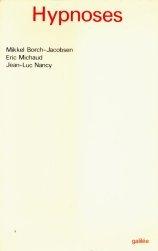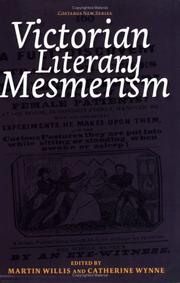| Listing 1 - 10 of 33 | << page >> |
Sort by
|
Book
Year: 2013 Publisher: [Place of publication not identified] : Firenze University Press,
Abstract | Keywords | Export | Availability | Bookmark
 Loading...
Loading...Choose an application
- Reference Manager
- EndNote
- RefWorks (Direct export to RefWorks)
The work analyses the complex relationship between mental illnesses and curative medicine in the writings of E.T.A. Hoffmann, highlighting problems deriving from unsuitable practices, and shedding light on the overwhelming, asymmetric relationship between doctor/patient, man/woman. The work analyses the doubling phenomena arising from the diaries, which Hoffmann overcame determined not to fall into madness; moreover, the author highlights Hofmmann's qualities as a man and a scholar, attentive to the limits of therapies, questioning doctors without understanding. The author summarises Hoffmann's ideas on the libertarian approach to illness, which includes the acceptance of the patient in their whole being, and presents his idea of therapy consisting of interpersonal dialogue and of listening to a story which reflects a similar case. The author also suggests the novelty of the "talking cure" method ante litteram, which was then successfully adopted by psychoanalysis: a method full of ideas, fruitful for literature, from Poe to Schnitzler, and for cinema, from Hitchcock to Kubrick.
Book
Year: 1892 Publisher: Aachen Barth
Abstract | Keywords | Export | Availability | Bookmark
 Loading...
Loading...Choose an application
- Reference Manager
- EndNote
- RefWorks (Direct export to RefWorks)
Hypnotism --- Mesmerism --- Animal magnetism
Book
Year: 1863 Publisher: Paris Jacques Lecoffre
Abstract | Keywords | Export | Availability | Bookmark
 Loading...
Loading...Choose an application
- Reference Manager
- EndNote
- RefWorks (Direct export to RefWorks)
Animal magnetism --- Magic --- Sleepwalking --- Spirit possession
Book
ISBN: 3515027084 Year: 1977 Publisher: Mainz Akademie der Wissenschaften und der Literatur
Abstract | Keywords | Export | Availability | Bookmark
 Loading...
Loading...Choose an application
- Reference Manager
- EndNote
- RefWorks (Direct export to RefWorks)

ISBN: 2718602554 9782718602554 Year: 1984 Publisher: Paris : Editions Galilée,
Abstract | Keywords | Export | Availability | Bookmark
 Loading...
Loading...Choose an application
- Reference Manager
- EndNote
- RefWorks (Direct export to RefWorks)
Hypnotism. --- Hypnose --- Hypnotism --- Autosuggestion --- Braidism --- Hypnosis --- Trance --- Animal magnetism --- Mesmerism
Book
ISBN: 1304468143 Year: 2013 Publisher: [Champaign, Illinois] : Sheba Blake Publishing,
Abstract | Keywords | Export | Availability | Bookmark
 Loading...
Loading...Choose an application
- Reference Manager
- EndNote
- RefWorks (Direct export to RefWorks)
Given the rich history of hypnosis, it's surprising that few people actively practice it. There is no real difference between ""hypnosis"" and ""self-hypnosis,"" as all hypnosis is really self-hypnosis: the former is guided with a therapist and the latter is self-administered. However, one can't be hypnotized without one's full participation - thus self-hypnosis is perhaps more valuable, since you can do it at home without paying the 100 an hour to a shrink. Powers' A Practical Guide to Self-Hypnosis offers the basics of the techniques, explains what it is and is not, and how to perform it
Hypnotism. --- Autosuggestion --- Braidism --- Hypnosis --- Trance --- Animal magnetism --- Mesmerism
Book
ISBN: 9783968217048 Year: 1998 Publisher: Baden-Baden : Rombach,
Abstract | Keywords | Export | Availability | Bookmark
 Loading...
Loading...Choose an application
- Reference Manager
- EndNote
- RefWorks (Direct export to RefWorks)
Vollständige Ausgabe im Original Verlagseinband (Steifumschlag / Broschur / Kartoneinband gr. 8vo im Format 15,6 x 24 cm) mit Rücken- und Deckeltitel auf dem Original-Schutzumschlag aus grünem Maschinen-Bütten. 364 Seiten, mit Hofmannsthal-Bibliografie, Mitteilungen der Hugo von Hoffmannsthal-Gesellschaft, Siglen- und Abkürzungsverzeichnis, Anschriftenverzeichnis der Mitarbeiter sowie Register. - Erstausgabe in sehr guter Erhaltung, wie neu Versand an Institutionen auch gegen Rechnung.
Hypnotism. --- Autosuggestion --- Braidism --- Hypnosis --- Trance --- Animal magnetism --- Mesmerism
Book
Year: 1865 Publisher: Paris Plon
Abstract | Keywords | Export | Availability | Bookmark
 Loading...
Loading...Choose an application
- Reference Manager
- EndNote
- RefWorks (Direct export to RefWorks)
Animal magnetism --- Baptists --- Jansenists --- Methodism --- Psychology, Religious --- Spiritualism
Book
ISBN: 051179293X 1108025897 Year: 2011 Publisher: Cambridge : Cambridge University Press,
Abstract | Keywords | Export | Availability | Bookmark
 Loading...
Loading...Choose an application
- Reference Manager
- EndNote
- RefWorks (Direct export to RefWorks)
Chauncy Hare Townshend (1798-1868), poet and collector, was a well-connected friend of Robert Southey and Charles Dickens. He became fascinated with Mesmerism while in Germany and went on to popularise it in England. This book, first published in 1840, was his passionate defence of Mesmerism. Developed in the late eighteenth century by Franz Mesmer, Mesmerism was a kind of hypnosis based on the theory of animal magnetism. With its spiritual associations and uncanny effects, it was an extremely controversial topic in the nineteenth century and its practitioners were widely considered fraudsters. Townshend describes in detail the mental states Mesmerism induces, which he identifies as similar to a state of sleepwalking. Perhaps most fascinating are the eye-witness accounts describing experiments carried out by Townshend on the continent, in which he hypnotised his subjects into feeling his own sensations and knowing things they could not know.
Mesmerism. --- Animal magnetism. --- Human magnetism --- Magnetism, Animal --- Magnetism, Human --- Mind-cure --- Biomagnetism --- Hypnotism --- Magnetic healing --- Magnetism --- Mental suggestion --- Mesmerism --- Therapeutics, Suggestive --- Alternative medicine --- Subconsciousness --- Animal magnetism

ISBN: 9042020083 9789042020085 9401203016 1429468076 9781429468077 9789401203012 Year: 2006 Volume: 160 Publisher: Amsterdam New York Rodopi
Abstract | Keywords | Export | Availability | Bookmark
 Loading...
Loading...Choose an application
- Reference Manager
- EndNote
- RefWorks (Direct export to RefWorks)
Victorian Literary Mesmerism examines the engagement between literature and mesmerism in Victorian writing. Drawing on recent trends in interdisciplinary literary scholarship the essays collected here investigate the complex connections between scientific mesmerism, its manifestations in the Victorian social and cultural world, and the literary imagination. Here, for the first time, the varied themes and contexts shaped by mesmeric practices are brought together in one volume. Mesmerism's influence on phrenology, medicine and mental health; its interaction with the occult and with communication technologies; the effects of mesmeric principles on gender and sexuality, as well as on criminal behaviour, are all set within the context of literary texts that interrogate and critique mesmerism's influence on the Victorians. This volume will be of interest, therefore, to scholars of Victorian literature and the history of science, as well as to those interested in cultural history with a focus on gender, sexuality, and sciences of the mind.
Mesmerism in literature. --- Mesmerism --- Alternative medicine --- Subconsciousness --- Animal magnetism --- Hypnotism --- Magnetic healing --- Therapeutics, Suggestive --- History
| Listing 1 - 10 of 33 | << page >> |
Sort by
|

 Search
Search Feedback
Feedback About UniCat
About UniCat  Help
Help News
News